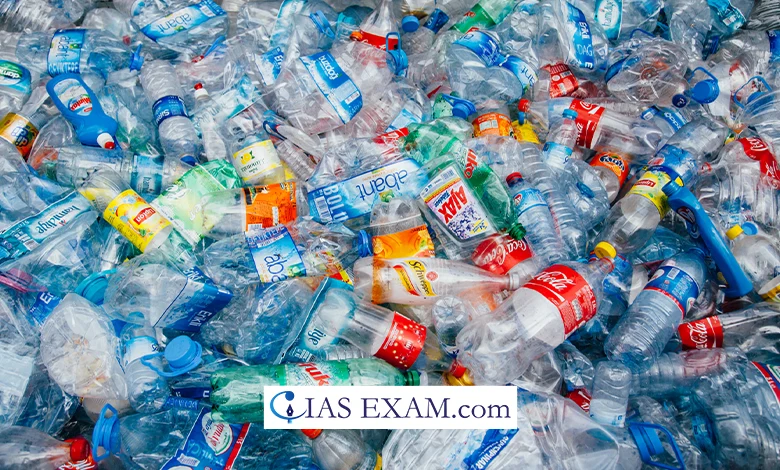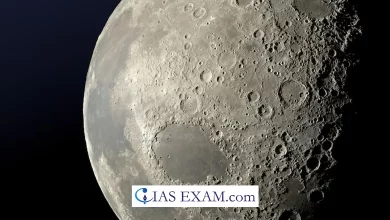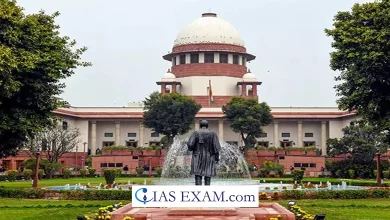India Prioritizes Regulation of Single-Use Plastic
Syllabus: Environment and Pollution [GS Paper-3]

Context
India has chosen to regulate single-use plastics rather than completely banning them before an important U.N. meeting, in line with their environmental policies and a practical approach to handling plastic waste.
Key Points of India’s Regulation Strategy
- Plastic Waste Management Amendment Rules (2021): India 2022 brought many changes and for a single-use plastics ban which included 19 categories but they usually used once and then disposed of.
- Selective Ban: However, the restriction only concerns some things, like plastic cups, spoons, and wrapping films, while plastic bottles and multi-layered packaging would be excluded.
- Enforcement Challenges: Nevertheless, the act of enforcement is not consistent in various parts of the country and what some outlets continue to supply are prohibited items.
- Expert Committee Report: Most importantly, the committee of experts evaluates the necessity of a certain plastic and its environmental effects to make a final decision to ban its usage.
Plastic Pollution: A Global Challenge
- Plastic pollution poses a significant environmental and health threat, prompting global efforts to tackle the issue.
- The United Nations Environment Assembly (UNEA) resolution to “end plastic pollution” in 2022 set the stage for international action on plastic waste management.
India’s Stance on Single-Use Plastic Regulation
- Ahead of a significant U.N. meeting, India has taken a strategic stance to regulate single-use plastics rather than implementing an outright ban.
- This decision aligns with the country’s broader environmental policies and reflects a pragmatic approach to managing plastic waste.
India’s Plastic Regulation Policies
- Plastic Waste Management Amendment Rules (2021):
-
-
- Meanwhile, India brought into the play, the Plastic Waste Management Amendment Rules (2021) in 2022; which prohibited 19 commonly used single-use plastics.
- On the one hand, getting rid of the ban cannot prevent it and makes everyone unaware of further what banned plastic products are sold.
-
- Expert Committee Recommendations
- The central government of India implemented the decision to ban several single-use plastics in order to comply with the advice given by experts on the plastics issue.
- The existing ban is not full coverage due to just a few single-use plastics, pointing to the fact that the regulation and control system is still not better yet.
India’s Negotiating Position on Plastic Pollution
- The Toronto Negotiations:
-
-
- The point of view of India on controlling plastic pollution is affected by complex talks in Toronto, Canada.
- The country questions regulations rather than outright ban harmful and unavoidable plastics.
-
- Science-Based Criteria:
- India has a stand on introduction of science-based procedures to confirm problems associated with plastics and accordingly, implement strategies.
- The environmental solutions were to be seen as the composite element that is concerned with the environmental problem and the practical elements.
Global Perspectives and Challenges
- Divergent Country Positions:
-
-
- Another country such as the EU and the US have different standpoints on plastic pollution control laying down the law.
- National differences in economic interests, recycling abilities, and waste incineration determine the proposed policy position and create obstacles for international cooperation.
-
- Implications for Global Action:
- There is no clear regulatory regime on plastic pollution across all nations which hampers any international efforts in this regard.
- Debates on economic benefits against environmental needs will continue to be the central issue of world trade arguments.
Future Directions and Sustainable Solutions
- Toward Sustainable Plastic Management:
-
-
- As plastic production continues to rise, sustainable solutions are needed to address plastic pollution.
- Collaborative efforts between nations, industry stakeholders, and civil society are essential for effective plastic waste management.
-
- Long-Term Environmental Sustainability:
- Achieving long-term environmental sustainability requires a holistic approach to plastic regulation and waste management.
- India’s regulatory stance on plastic pollution reflects a commitment to balancing environmental protection with economic considerations.
Conclusion
India’s approach to plastic pollution regulation underscores the complexities of addressing environmental challenges in a global context. By advocating for regulation over elimination, India seeks to strike a balance between environmental protection and economic interests. As international negotiations continue, collaboration and dialogue among nations will be crucial for developing sustainable solutions to plastic pollution.
Source: The hindu
UPSC Mains Practice Question
Q. Discuss India’s strategy of prioritising regulation over outright banning of single-use plastics in its efforts to combat plastic pollution. Analyse the advantages and disadvantages of this approach, considering both environmental sustainability and economic implications.





.png)



